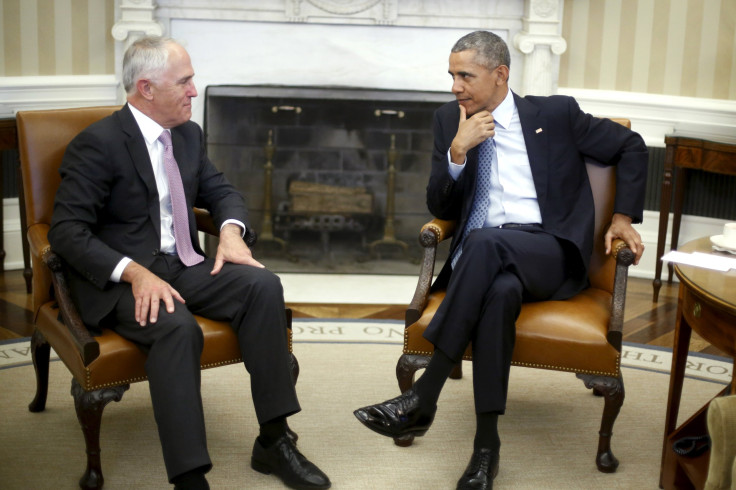Turnbull tells US legislators: look at 'big picture' benefits of Trans-Pacific Partnership (TPP)

Malcolm Turnbull has directly lobbied US legislators to pass the Trans-Pacific Partnership (TPP) agreement, which he describes as “a very critical part of America’s continued presence in the Asia-Pacific”.
Turnbull stressed the TPP’s importance in his talks with politicians on Capitol Hill, who included Senate Majority Leader Mitch McConnell, as well as in an address to the US Chamber of Commerce.
Emphasising the TPP was more than just a trade deal, Turnbull told his business audience: “It is a very important element in the maintenance of the United States as the credible, strong, consistent enduring guarantor of the rules-based international order. It sets a very high bar. It encourages countries to reform”.
US President Barack Obama is pressing hard for congressional passage, in the face of strong political resistance. If the 12-nation agreement, struck late last year, cannot be passed before the November presidential election, it is hoped it could get through before Obama leaves office next January.
Speaking ahead of his congressional talks Turnbull said he would urge legislators “not to lose sight of the wood for the trees, not to get lost in this detail or that detail … because the big picture is the rules-based international order, which America has underwritten for generations, which has underwritten the prosperity and the economic growth from which we have all benefitted”.
The TPP’s passage was canvassed in Turnbull’s Oval Office meeting with Obama, in which the battle against Islamic State (IS) was the main focus. Turnbull briefed Obama on his visits to Iraq and Afghanistan. Improving the use of cyberspace to counter IS was discussed, a theme that Turnbull has emphasised in his two-day visit to Washington, as well as other challenges posed by the cyberworld.
Obama referred to last week’s terrorist attack in Jakarta, saying it was “a reminder that Southeast Asia has generally done a very effective job fighting against extremism, but it is an area that we have to pay attention to and watch”.
In his Chamber of Commerce speech Turnbull singled out Indonesia as an example of how the TPP could be used leverage reform.
He said President Joko Widodo – “a charismatic, reforming president” – was obviously seeking to deal with vested interests. “The TPP offers a powerful argument in his armoury to argue for reform because he can say … ‘Look the Vietnamese have entered into the TPP, they’re going to get all of these advantages, if we don’t get on board we’ll be left behind.’”
Economic analysts who said the TPP would add only a very small percentage to a given country’s GDP often missed the things that were hard to measure, Turnbull said.
“And what is significant is the stability, the prosperity, the growth … in our region, which is unprecedented in human history, could not have occurred without the strong position, the strong presence of the United States.” The TPP was a critically important part of continuing that.
He also dismissed fears about opening markets a little more as “an extraordinary counsel of despair”.
The US had created globalisation, and Americans should be confident that as markets were opened their business people, scientists and engineers would be able to compete with the best and outpace most of them.
“The reality is that the TPP offers opportunity to the United States. There is very little at risk from freedom for such a strong innovative economy as this.” And there was much to gain in the region because the more connected and transparent the economies became and the stronger the rule of law in each country, the greater the cost of anyone seeking to disrupt them, he said
Turnbull has announced a strengthening of ties between Australia and the US on cyber security, with an annual Australia-US Cyber Security Dialogue. This dialogue, jointly convened by the Australian Strategic Policy Institute and the US Centre for Strategic and International Studies, will have representatives from business, academic and government sectors discussing common cyber threats, promoting cyber security innovation and shaping new business opportunities.
In a statement, Turnbull said: “We will continue to work closely together to ensure the internet remains open, free and secure by promoting peacetime ‘norms’ for cyberspace.
“But we also must be ready to respond to cyber incidents when and if they occur. This means we need to better understand how Australia and the US would co-operate in the event of a significant cyber incident affecting both nations. To achieve this, we agreed to improve our response efforts.”
The two countries will also enhance co-operation to deal with cybercrime.
Michelle Grattan, Professorial Fellow, University of Canberra
This article was originally published on The Conversation. Read the original article.




















